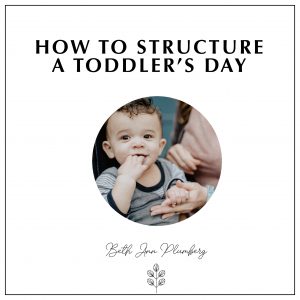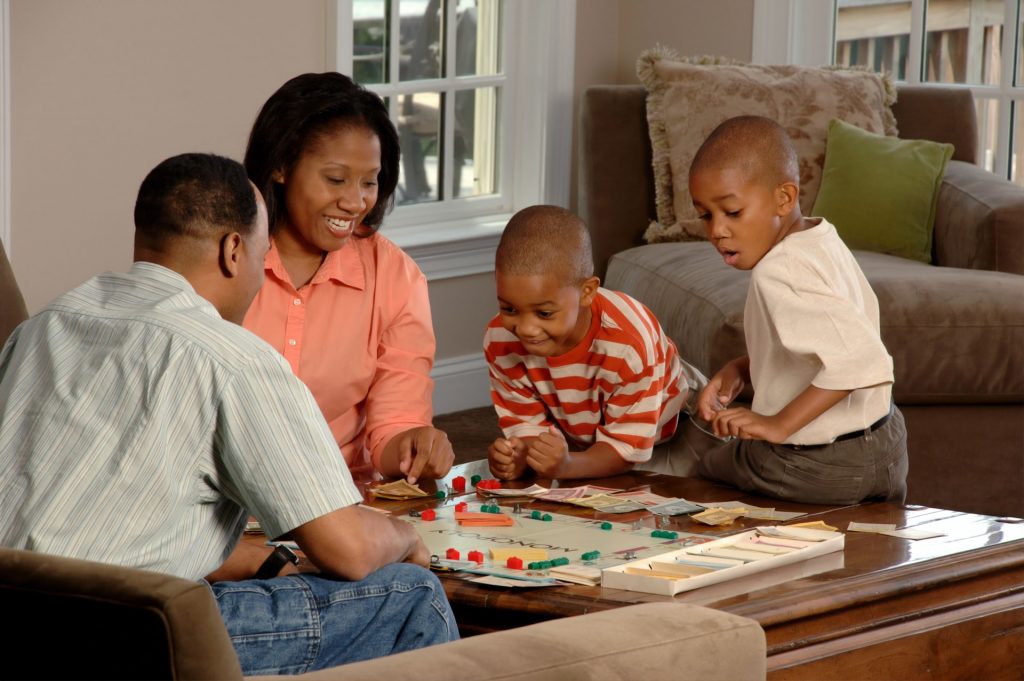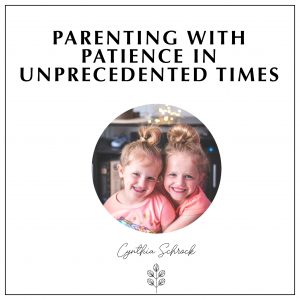Structuring Your Toddler’s Day
posted in: Uncategorized
0
As a young mom, I understood the need to be proactive in structuring my toddler’s day and that routine was important in his developing world. But honestly, I was stumped at times with what to do to keep him entertained so I could get something done. During this season I learned two things that helped me tremendously:
- First, I learned that my son didn’t need constant “entertainment” and I should think more in terms of training than just keeping him busy. It turns out, toddlers can be entertained by pretty much anything, so I considered each activity for its training value as much as its ability to keep him occupied. My goal was not to just come up with an exhaustive list of fun things for my child to run through during his day, but rather to engage him purposefully to teach him and nurture him in fun and loving ways.
- Second, I learned that I could incorporate my son into the activities of my day. This did slow me down a bit at times, but for my busy toddler it kept life interesting and gave us many opportunities for additional teaching and fun interactions. After all, I wanted to enjoy my son’s company. Since I couldn’t spend all my time playing with him, it made sense to bring him into my activities where I could.
Here are some things to consider as you structure your day at home with a busy toddler.
- Fill the big pieces of the day first: meals, naps and non-negotiables
I always found it helpful to write things out. To start, take a piece of paper marked out with the hours of the day from your child’s wake time to bedtime. Fill in meals, naps and things in your day that are not negotiable (like meal preparation, devotion time, and appointments.) These activities become the framework to the day and create a flow for it. You don’t have to watch the clock but these things should be at routine times and regularly in the same order. This helps you to manage the needs of your toddler and fulfill the other responsibilities in your day with enough space left for the other things that may come up.
- One-on-one time with your toddler
Next, where is it best to place one-on-one time with your child? This isn’t necessarily the only time you will have it, but there should be a 20-30 minute time to focus undistracted on your toddler. There are a million ideas on the internet to fill this time with fun and/or educational activities. There are a variety of things to choose, from active games, reading, and fine motor activities to simple crafts and puzzles. Find a time when your child is rested and ready to engage – maybe early in the day after breakfast or after nap time and a little snack. I often used this time to work on getting my child to come to me with a fun game or would practice “please” and “thank you” while sharing toys. Through play I might encourage whatever milestone I saw emerging in language, problem solving, or motor skills. I might help him explore a toy in a new way and then later in independent play time, let him explore this same toy further. There was always time for hugs and cuddles, too. The point is, I made this time a priority in my day.
- Consider what your toddler can do with you
Consider which of your activities your toddler can do with you and let him participate. Little ones love to be “Mommy’s little helper” and do what we do. When it was chore time around our house, my boys helped me dust, fold laundry, and wash dishes. Even if they were no help at all, folding towels or diapers could be a fun game of peek-a-boo! They often stood on a chair (with me behind them to be safe) while I washed dishes in the sink. So on your daily schedule fill in chore times where they can work alongside you. This is great one-on-one training time. You can engage in singing, work on language skills and learn verses all while you do a mindless chore. We often did chores to music. My children don’t remember a time when they didn’t help me with chores. As they grew, they learned many skills along the way, as well as the joy of serving.
- Consider what your toddler can do nearby while you do something.
Not every task lends itself to help from a toddler. When that wasn’t practical, but I could still engage while I worked, I often opted to keep my son near me. When I prepared dinner, the youngest was always in the kitchen with me. He might be in the highchair with a toy or book, in a walker or playing in “his” cabinet at my feet. (His cabinet contained plastic dishes and lids, a few toys and wooden spoons and he was only allowed to get into it at this time of day to keep it interesting. I just always washed anything in that cabinet before I used it!) In this way, I could still talk to my son while he had something fun to do and I got dinner made. A toddler is often content to play independently when Mom is nearby and still available to engage on occasion. If you can’t keep an eye on your toddler while you do something else, then that’s a good time to do pack n’ play time.
- And then there’s everything else!
I saved nap time and pack-’n-play time for those tasks that needed my undivided attention. I trained my son to independently play in the playpen for 45 minutes at a time. That time, together with one or two nap periods, gave me 3-5 hours each day to focus on computer tasks, interests, projects, and household duties.
On days when we needed to go out for appointments, errands or visits, I did my best to do those things right after breakfast or soon after naps. If it was necessary to skip a nap, it would be the morning one so I could get my son down early for a bit longer afternoon nap.
- Don’t forget why
In Deuteronomy 6:7, parents are instructed to “impress” God’s commands on their children and, “Talk about them when you sit at home and when you walk along the road, when you lie down and when you get up.” (NIV) I learned that structuring my toddler’s day gave me a framework for fulfilling this command. I was able to maximize the time I had to teach and train and speak often of the Lord as my child grew from a busy toddler to a delightful preschooler. I pray these ideas bless and help you as you try to get it all done in the midst of these busy toddler days.
Beth Ann Plumberg has been a Contact Mom for 25 years. She and her husband, Chuck travel full-time in an RV to keep up with their grown children. They have 4 wonderful sons, 4 beautiful daughters-in-love and 5 adorable grandchildren with number 6 on the way.





